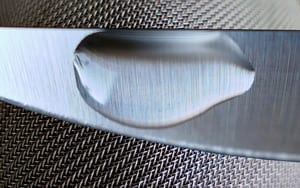Stainless steel, especially the 400 series stainless steel, is one of the most advantageous of all stainless grades. Known primarily for its wear-resistance, the diverse range of the series allows for accommodation across various industries. Having so many options within the 400 series requires education about what’s appropriate for the job.
Here are a few things to consider when selecting 400-grade stainless steel.
Properties of 400 Series Steel
Stainless steel is a metal alloy, meaning the steel is mixed with other elements such as nickel, silicon, aluminum, carbon, chromium, and molybdenum. Specifically, 400 series stainless steel is part of the “18-0” family – it’s comprised of 18% chromium and 0% nickel.
While 400 series exhibits less corrosion-resistance than 300 series under some conditions, it offers very high strength and is magnetic. Treating 400-grade with heat will harden the steel and can help improve corrosion-resistance. This series typically costs less, making it a cost-effective alternative to 300-series steel, and is well-known for providing quality surface finishes.
Ferritic vs Martensitic Stainless Steels
400-grade stainless steel falls into two families – ferritic and martensitic, differing based on the structure of the materials.
Ferritic Stainless
Ferritic stainless alloys (specifically grades 430 and 434) contain up to 27% chromium and no significant nickel content, which reduces corrosion resistance but is ideal for high-temperature applications.
Martensitic Stainless
Martensitic stainless alloys (including both 400 and 500 series) offer increased hardness and can be hardened by a combination of both cold and heat treatments. These alloys contain between 12-14% chromium, up to 1% molybdenum, and no significant nickel content. Martensitic alloys have lower corrosion-resistance than ferritic alloys but are considered very strong.
Applications for 400 Series Stainless Steel
The corrosion-resistance, stain-resistance, low maintenance, and cost-effectiveness make it a versatile material that can be used across industries. Some examples of industry applications include:
- Agricultural equipment
- Automotive exhaust system components, silencers and heat exchangers
- Axles, fasteners and shafts
- Food industry equipment
- Hardware
- Motor shafts
- Surgical cutting tools
- Miscellaneous wear-resistant applications such as bearings, knives, and razor blades
Contact the Stainless Steel Float Experts
The team at Arthur Harris & Co. knows stainless steel. As a trusted leader in the steel float manufacturing industry, we have the knowledge and hands-on experience to deal with just about any type of steel application. We are proud to produce over 2,000 different variations of stainless steel float designs, with orders that can reach over 50,000 pieces.
We also provide heat treating, polishing, passivating, annealing or any other steel requirement you may have for your tank or float. To learn about our stainless steel products, contact us today!





